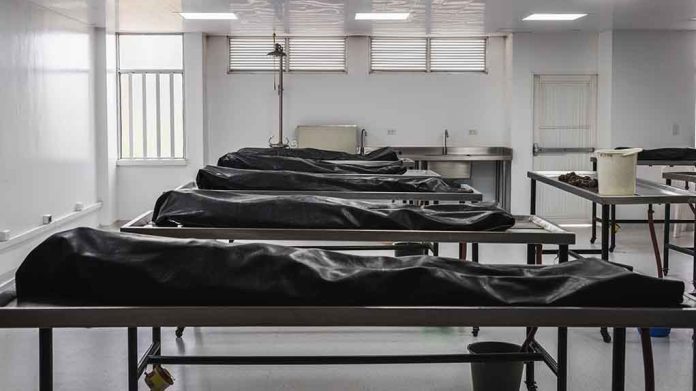
A tragic boat accident on Lake Kivu in the Democratic Republic of Congo claims at least 78 lives, exposing severe safety issues in the region’s water transport system.
At a Glance
- An overcrowded vessel carrying 278 passengers capsized on Lake Kivu, killing at least 78 people
- The boat was traveling from Minova to Goma and sank near the port of Kituku
- Overcrowding, lack of life jackets, and a strong storm contributed to the tragedy
- Ongoing conflict between armed forces and M23 rebels has forced many traders to rely on dangerous water transport
- Families of victims and local residents demand accountability and improved safety measures
Deadly Accident Highlights Ongoing Safety Concerns
Congolese authorities are investigating a devastating boat accident on Lake Kivu that resulted in the deaths of at least 78 people. The overcrowded vessel, carrying 278 passengers, was en route from Minova to Goma when it capsized near the port of Kituku. Witnesses reported seeing the boat overturn within minutes, leaving many passengers struggling for survival in the treacherous waters.
The tragedy has once again brought attention to the pressing issues surrounding transportation safety in the Democratic Republic of Congo. Overcrowding and non-compliance with maritime regulations are common problems in the country’s water transport system, putting countless lives at risk daily. The lack of life jackets on board and a sudden storm were significant factors contributing to the high death toll in this incident.
At least 78 people have died after a ferry capsized on Lake Kivu, in the Democratic Republic of Congo.
A video circulating online shows the boat tilting to one side and then sinking. It is believed there were 278 passengers onboard.https://t.co/Jbin8yizlK
— BBC News Africa (@BBCAfrica) October 4, 2024
Regional Conflict Exacerbates Transportation Risks
The accident highlights the complex challenges facing the region, where ongoing conflict between armed forces and M23 rebels has forced many traders to rely on dangerous water routes. With roads often inaccessible due to security concerns, boats have become a lifeline for commerce and travel, despite the inherent risks.
“We are afraid,” he told the AP. “This shipwreck was predictable.”
This sentiment, expressed by a local resident, underscores the widespread fear and frustration among those who depend on these perilous waterways. The predictability of such disasters points to a systemic failure in addressing known safety issues, leaving communities vulnerable to repeated tragedies.
Calls for Accountability and Improved Safety Measures
In the wake of this disaster, families of victims and local residents are demanding accountability from authorities and calling for improved safety measures. Many accuse the government of negligence and failing to address the root causes of these accidents, including regional insecurity and inadequate maritime regulations.
“We will establish responsibilities and put in place a sanctions regime but also recommendations to improve navigation on the lake,” Purusi told the AP.
While officials have promised to investigate the incident and implement new safety protocols, skepticism remains high among affected communities. The recurring nature of such accidents in Congo’s waterways, including recent capsizes on Lake Kivu and other bodies of water, has eroded public trust in the authorities’ ability to protect citizens.
A Congolese governor says at least 78 people died when an overcrowded boat with 278 passengers capsized on Lake Kivu in eastern Congo on Thursday. https://t.co/UUkUVRsjcX
— The Associated Press (@AP) October 3, 2024
A Call for Comprehensive Reform
As rescue efforts continue and the death toll potentially rises, this tragic event serves as a stark reminder of the urgent need for comprehensive reform in Congo’s transportation sector. Improved safety regulations, stricter enforcement of passenger limits, and investments in alternative transportation infrastructure are critical steps needed to prevent future loss of life.
The international community’s attention is now focused on the Democratic Republic of Congo, with hopes that this latest tragedy will spur meaningful action to address the longstanding issues plaguing the country’s waterways. As families mourn their losses and survivors grapple with the aftermath, the call for change grows louder, demanding a future where safe travel is not a luxury but a basic right for all Congolese citizens.
Sources:
- Congolese authorities launch investigations into deadly boat accidents
- At least 78 people dead after boat capsizes in eastern Congo, official says
- 78 drown after boat capsizes in Congo’s Lake Kivu, provincial governor says
- At Least 78 Dead After Boat Capsizes on a Lake in Eastern Congo
- Ferry Capsizes On Lake Kivu, Leaving 78 Dead In DR Congo Tragedy














